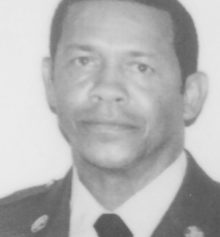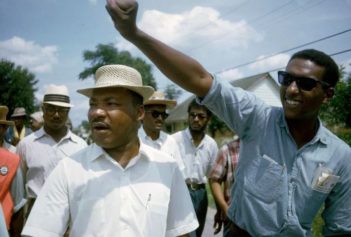Why Sgt. Rodney M. Davis lunged atop that enemy grenade at the expense of his own life on Sept. 6, 1967 is the quintessential question that has haunted not only those who stood closest to him at that critical moment, but his own family and friends as well for more than four decades.
Why would a young man with a beautiful wife and two infant children eagerly awaiting his return home from Vietnam commit such a noble and courageous, yet sacrificial act? And for Marines he barely knew? And for a country that often treated him like a second-class citizen at the time?
That Davis was posthumously awarded the Medal of Honor at the White House on March, 26, 1969 did little to assuage the heartbreak felt by the many friends and family he left behind. Nor will the latest honor to come his way on Saturday’s 237th birthday of the U.S. Marine Corps when his hometown of Macon, Georgia honors the city’s lone Medal of Honor recipient with the unveiling of the Sgt. Rodney M. Davis Memorial Monument and Scholarship Fund.
Davis was just 25 when he died in Vietnam’s Que Son Valley as part of Operation Swift, but his inspirational life and death continue to reverberate, both in the sleepy, central Georgia town in which he grew up and beyond.
He had arrived in country just three weeks earlier when he and his 200 fellow Marines from Bravo Company, First Battalion, Fifth Regiment, First Marine Division stumbled into an NVA regiment of some 2,500 men, according to U.S. military records.
The Marines were soon forced to retreat from the numerically superior force charging at them. The NVA forces had soon forged close enough to toss hand grenades at the retreating Americans when two landed in the trench Davis was sharing with five other Marines. Davis saw the lethal bomb at their feet and didn’t hesitate to act, jumping on the grenade before using both hands to shove it underneath his body as to intentionally absorb the entire impact at the expense of his own life.
It mattered little to Davis that the five Marines in that trench with him at the time happened to all be white during one of the most tumultuous social periods in America’s history that saw more than 100 American cities suffer race riots during the summer of 1967. Jim Crow was still the law of the land in Davis’ hometown of Macon.
They were all Marines, and eternal brothers-in-arms.
Davis’ 2nd Platoon began the day with 48 men, including a two-man sniper team, two machine gunners and an artillery observer. By the end of Sept. 6, all but 11 had either been killed or wounded seriously enough to warrant immediate evacuation. Of the 11 remaining Marines, seven would later receive Purple Hearts for gunshot wounds suffered during the day’s fierce fighting that ranked as among the worst of the entire Vietnam War.
Gordon Davis often says he was not surprised to hear the details of his younger brother’s heroic death and that he would have been more stunned if he hadn’t done as much.
That’s because Rodney Maxwell Davis, the second-oldest of five children born to Ruth Amanda and Gordon Davis, Sr., had lived an exemplary life of honor, courage and commitment long before receiving a U.S. Marine Corps emblem signifying his embodiment of such traits. Looking after his siblings and others who needed help in fending for themselves had been his life’s calling.
He would do no less for his new brothers in the U.S. Marine Corps.
It takes a special man with a unique devotion to his country to defend it even though it has denied him full rights as a citizen. It takes an even more extraordinary one still to willingly sacrifice his own life for that country.
That Davis did so without hesitation so as to spare the lives of his fellow Marines speaks volumes about the man, his principles and his unflinching courage even in the face of certain death. Color didn’t matter at all at least in that steamy sliver of the world thousands of miles away as each man depended on one another for survival no matter their race, creed or pedigree.
Davis wasn’t perfect by any means, but remained true to his convictions, ultimately at the expense of his own life. He is one of just 87 African-Americans to have been awarded the Medal of Honor of the more than 3,400 that have been handed out in our nation’s history.
*John Hollis has 17 years of experience as a newspaper reporter, 15 of which were spent as a sportswriter. He has covered everything from the Super Bowl to the Olympics, major college football and basketball in both the ACC and SEC, three men’s college basketball Final Fours, the NBA, the NFL, the College World Series and just about everything in between. In addition, Hollis has previously served as an Atlanta correspondent for Time Magazine.
Hollis is currently working on a book about the life and death of Sgt. Rodney M. Davis. His wife, Regina, is Sgt. Davis’ niece.


